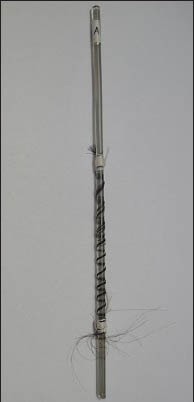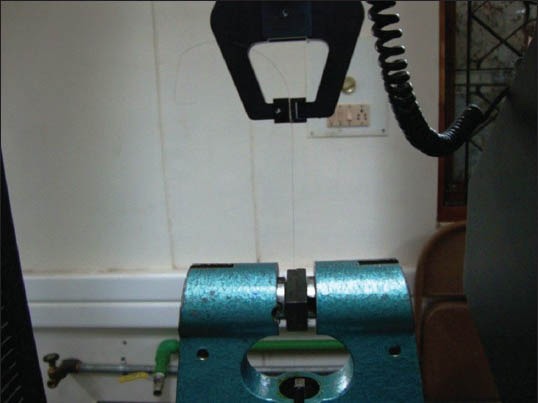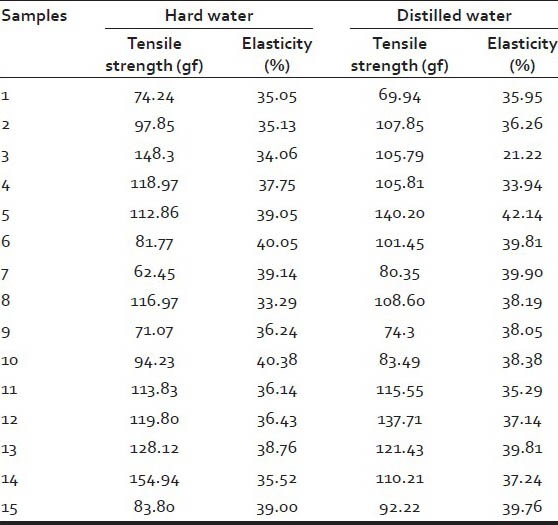Abstract
Background:
Hardness of water is determined by the amount of salts (calcium carbonate [CaCO3] and magnesium sulphate [MgSO4]) present in water. The hardness of the water used for washing hair may cause fragility of hair.
Objective:
The objective of the following study is to compare the tensile strength and elasticity of hair treated in hard water and hair treated in distilled water.
Materials and Methods:
10-15 strands of hair of length 15-20 cm, lost during combing were obtained from 15 volunteers. Each sample was cut in the middle to obtain 2 sets of hair per volunteer. One set of 15 samples was immersed in hard water and the other set in distilled water for 10 min on alternate days. Procedure was repeated for 30 days. The tensile strength and elasticity of the hair treated in hard water and distilled water was determined using INSTRON universal strength tester.
Results:
The CaCO3 and MgSO4 content of hard water and distilled water were determined as 212.5 ppm of CaCO3 and 10 ppm of CaCO3 respectively. The tensile strength and elasticity in each sample was determined and the mean values were compared using t-test. The mean (SD) of tensile strength of hair treated in hard water was 105.28 (27.59) and in distilled water was 103.66 (20.92). No statistical significance was observed in the tensile strength, t = 0.181, P = 0.858. The mean (SD) of elasticity of hair treated in hard water was 37.06 (2.24) and in distilled water was 36.84 (4.8). No statistical significance was observed in the elasticity, t = 0.161, P = 0.874.
Conclusion:
The hardness of water does not interfere with the tensile strength and elasticity of hair.
Keywords: Calcium carbonate, hair, hardness of water, magnesium sulphate, tensile strength and elasticity
INTRODUCTION
Hair loss and breakage is a common problem. Patients often implicate the use of hard water on hair for its brittleness and breakage and believe that soft water prevents damage. Hardness in water is that characteristic, which prevents the lathering of soap. Hardness in water is imparted by the salts in the water. Calcium carbonate (CaCO3) and magnesium sulphate (MgSO4) are the salts that are found in excess in hard water.[1] Hardness of water can be classified as temporary and permanent hardness. Temporary hardness is predominantly due to the bicarbonate salts dissolved in the water and can be removed by boiling. Permanent hardness is predominantly due to the sulphate salts dissolved in water and it cannot be removed by boiling. This study was undertaken to determine whether hard water would adversely affect the tensile strength and elasticity of hair.
MATERIALS AND METHODS
A total of 15 female volunteers of age 20-25 were selected. 10-15 hair strands of length 15-20 cm, which was lost during combing was obtained from each volunteer. Hair was cut in the middle to obtain 2 samples per volunteer. Each sample contained 10-15 strands of hair. The hair was wrapped over glass rods from distal to the proximal end and tied at both ends with nylon threads [Figure 1]. One set of 15 hair samples was immersed in hard water and another set of 15 samples was immersed in distilled water for 10 min on alternate days and air dried. This procedure was repeated for 30 days. The amount of CaCO3 and MgSO4 in hard water and distilled water was determined by water analysis, estimation of hardness by ethylenediamine tetraacetate method.[2] The tensile strength and elasticity for 5 hairs was determined separately for each sample by INSTRON 5500R (universal strength tester) [Figure 2]. The machine works on the principle of constant rate of extension and pneumatic clamps were used during the process [Figure 3]. The statistical analysis was performed using SPSS version 19 (IBM, www.ibm.com/software/analytics/spss). Statistical significance was defined as P < 0.05.
Figure 1.

Hair wound on glass rod and tied on both ends with nylon threads
Figure 2.

INSTRON universal strength tester
Figure 3.

Hair placed between the clamps of INSTRON
RESULTS
Water can be classified based on the hardness as follows[3] [Table 1].
Table 1.
Classification of water based on hardness

The amount of salts (CaCO3 and MgSO4) present in the hard water and distilled water that was used in the study is given in Table 2.
Table 2.
Water analysis report

Mean values of tensile strength and elasticity of the 15 samples treated with hard water and distilled water are shown in Table 3.
Table 3.
Tensile strength and elasticity of hair samples treated in hard water and distilled water

The mean values were compared using t-test [Table 4].
Table 4.
Statistical analysis report

There was no Statistical difference in tensile strength and elasticity between the two groups.
DISCUSSION
Hair has been one of the important assets for people for ages. Misleading advertisements on increasing the strength of hair is common these days and this exploits the concern of the individual for the hair. In many places there is water shortage and ground water is used for cleansing and washing purposes. It is commonly believed that the usage hard water results in hair breakage. This study was undertaken to compare the tensile strength and elasticity of hair treated with hard water and soft water. Our study designed to study the hair under the usual circumstances showed that there was no statistical difference in the tensile strength and elasticity between the hairs treated with hard water and distilled water, however in the presence of higher salt content or if the hair is exposed to hard water for longer periods, the findings may be altered.
CONCLUSION
Based on the above study it can be concluded that there was no statistical difference in the tensile strength and elasticity between the hairs treated with hard water and distilled water, hence we conclude that hard water does not interfere with the tensile strength and elasticity of hair.
ACKNOWLEDGEMENTS
All the authors sincerely thank Mr. R. Pasupathi, M.Tech, MBA, Textiles Physics Department, from South Indian Textile Research Association, Coimbatore for his guidance in determining the tensile strength and elasticity of hair in INSTRON.
Footnotes
Source of Support: Nil
Conflict of Interest: None declared.
REFERENCES
- 1.Fawell JK. Hardness in Drinking-water, 2003. [Last cited on 2013 Oct 01]. Available from: http://www.who.int/water_sanitation_health/dwq/chemicals/en/hardness.pdf .
- 2.Dara SS, Umare SS. 12th Ed. New Delhi: Chand S and Co; 2010. A Textbook Of Engineering Chemistry; pp. 7–8. [Google Scholar]
- 3.U.S. Geological Survey USGS Office of Water Quality. [Last modified on 2013 Aug 21 16:50:48 EDT, Last cited on 2013 Oct 01]. Available from: http://www.water.usgs.gov/owq/hardness-alkalinity.html#briggs .


